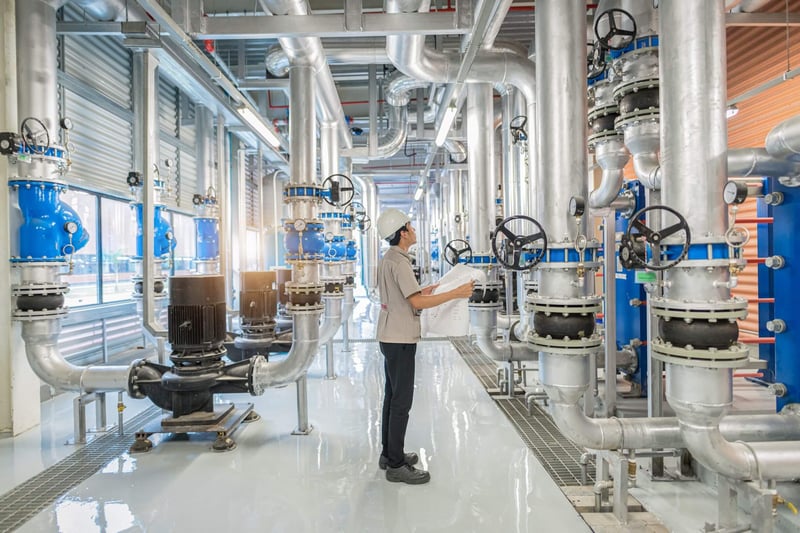Share this
What Your Rotating Equipment Inspection Checklist May Have Missed
by Malik Durojaiye on 11/12/20 7:45 AM

For refineries processing hazardous materials, accidental release or leakage of fluids from centrifugal pumps has always been a major concern for plant safety. Mechanical seals are one of the important parts of a centrifugal pump to curb process fluid from escaping. However, due to various factors, they stand at a risk of developing into a potential leak point. Any leak of hazardous material can lead to asset damage and environmental risk for operators working nearby. Moreover, when the seal goes down, the pump will shut down, followed by failure of the entire process system, resulting in production loss.
The best way to ensure your rotating equipment is running efficiently is to add critical items related to the mechanical seal support system to your periodic rotating equipment inspection checklist.
Critical Aspects of Mechanical Seal Failure
In any industrial environment, seal support systems can be subjected to damage that diminishes their efficiency. You’ll want to make sure the following are on your rotating equipment inspection checklist:
Isolation Valves
Isolation valves are important to ensure safe process control in the event of any maintenance. Additionally, an ideal valve package achieves zero leakage, tight shutoff, and prevents damage to the equipment. Their failure can have a substantial impact on the system performance during shutdown. Ensuring a higher density of isolation valves reduces the chance of valve failure.
Block-and-Bleed Valves
Another item on your rotating equipment inspection checklist should be block-and-bleed valves. A reliable pump must have block-and-bleed valves that offer easy maintainability in the event of any routine maintenance checkup or parts replacement. You should be able to easily remove or calibrate without shutting down the system.
Seal Burn and Seal Flatness
Sometimes, pump seals dry or burn up due to operator error, resulting in heat-building fraction. If not addressed immediately, the hard seal faces can reach a very high temperature, resulting in burnt elastomer parts and immediate leakage. Also, it is important to check the flatness of the mechanical seal faces. If the surface has scratches, it will not allow for a uniform fluid film and may result in leakage. The system should have a quality seal support system in place to address these issues with ease (as per API Plans 31, 32, 52, 53, 54).
Seal Contamination
Any shaft misalignment gives rise to the development of small insoluble particulates in the process fluid. These particulates are sulphur-rich that can easily damage the seal support system, leading to fluid leakage, noisy starting and shaft seal hang up. The best way to avoid leakage or any of such situations is to go for seal faces with greater durability. You can also consider adding cyclone separators to keep the process fluid free from any particulates as per API Plans 12, 22, 31, and 41.
Changes to Seal Chamber Environment
Mechanical seals prevent fluid leaks and keep contaminants out of a vessel where a rotating shaft passes through a stationary housing. However, in order to accomplish this, they need to inject processed fluids or water into the chamber at a required temperature, pressure, and flow. The smooth running of these process conditions is met by pumps and seal support systems ideally designed for the same. If any of these conditions changes, the seal support system may eventually meet mechanical failure for operating beyond its optimum operating environment.
There are certain ways to effectively control the seal chamber environment. For instance, you can reduce the fluid temperature by using heat exchangers, which is often termed as seal coolers. You can also use pumping rings to offer the least resistance to the flow. Your local mechanical seal support partner can help you plan modifications required to accommodate the new seal chamber environment.
Protect Mechanical Seals with Your Rotating Equipment Inspection Checklist and Local Expert Support
When it comes to the longevity of your centrifugal pumps, it is imperative to keep your rotating equipment inspection checklist updated with items related to the mechanical seal support system. In this regard, Swagelok Field Engineers can offer you a helping hand in updating your PHA for centrifugal pumps to improve pump efficiency and avoid unplanned downtime.
Our Field Engineers will run a thorough evaluation of your existing system on-site and will propose new replacements and design changes, if required. We can also offer you the added advantage of building designs with configurable CAD file systems and scaling with Swagelok Northern California’s seal plan kits and assemblies. Swagelok seal support design incorporates all the best practices as per API 682. We also incorporate design principles that are easy to maintain and simple to install. As a local supplier, we can instantly meet your needs without any lag time owing to parts shipping.
To learn how Swagelok Northern California can help you with centrifugal pump mechanical seal leaking troubleshooting and all your seal support system needs, contact our team today by calling 510-933-6200.

About Malik Durojaiye | Field Engineer, Assembly Services
Malik Durojaiye began his Swagelok career in 2019 as a Custom Solutions Engineer in our Assembly Services group. Prior to Swagelok, Malik developed as a design engineer as well as a manufacturing engineer for 6 years serving Kentucky and California with Altec Industries; a leading provider of products and services to the electric utility, telecommunications, tree care, lights and signs, and contractor markets.
Share this
- Archive (465)
- Assembly Services (207)
- About (100)
- Seal Support Systems (96)
- Best Practices (88)
- Training Services (74)
- Fittings (51)
- Semiconductor Applications (49)
- Hoses and Flexible Tubing (47)
- Regulators (44)
- Tubing (42)
- Grab Sampling Systems (32)
- Sampling Systems (32)
- Gas Systems (30)
- Services (30)
- Downloads (29)
- Valves (24)
- Application Support (18)
- Orbital Welding (17)
- Case Studies (13)
- Steam Systems (13)
- Frequently Asked Questions (12)
- Tools (12)
- Measurement Devices (7)
- Subsystems (6)
- Thermal Management (6)
- September 2023 (1)
- August 2023 (2)
- June 2023 (1)
- March 2023 (3)
- February 2023 (3)
- January 2023 (4)
- December 2022 (4)
- November 2022 (4)
- October 2022 (4)
- September 2022 (1)
- August 2022 (3)
- July 2022 (2)
- June 2022 (4)
- May 2022 (1)
- April 2022 (2)
- March 2022 (1)
- February 2022 (2)
- January 2022 (3)
- December 2021 (1)
- November 2021 (6)
- October 2021 (6)
- September 2021 (8)
- August 2021 (4)
- July 2021 (3)
- June 2021 (6)
- May 2021 (6)
- April 2021 (7)
- March 2021 (5)
- February 2021 (4)
- January 2021 (6)
- December 2020 (5)
- November 2020 (6)
- October 2020 (6)
- September 2020 (8)
- August 2020 (7)
- July 2020 (8)
- June 2020 (8)
- May 2020 (6)
- April 2020 (9)
- March 2020 (7)
- February 2020 (10)
- January 2020 (21)
- December 2019 (23)
- November 2019 (21)
- October 2019 (22)
- September 2019 (21)
- August 2019 (22)
- July 2019 (23)
- June 2019 (20)
- May 2019 (23)
- April 2019 (22)
- March 2019 (21)
- February 2019 (20)
- January 2019 (21)
- December 2018 (14)
- November 2018 (19)
- October 2018 (23)
- September 2018 (17)
- August 2018 (29)
- July 2018 (11)
- June 2018 (6)
- May 2018 (5)
- April 2018 (4)
- March 2018 (5)
- February 2018 (3)
- January 2018 (3)
- December 2017 (2)
- November 2017 (4)
- October 2017 (3)
- September 2017 (2)
- August 2017 (6)
- July 2017 (4)
- June 2017 (4)
- May 2017 (4)
- April 2017 (3)
- March 2017 (4)
- February 2017 (3)
- January 2017 (3)
- December 2016 (3)
- November 2016 (3)
- October 2016 (3)
- September 2016 (5)
- August 2016 (5)
- July 2016 (4)
- June 2016 (5)
- May 2016 (3)
- April 2016 (4)
- March 2016 (5)
- February 2016 (11)
- January 2016 (1)
- December 2015 (3)
- November 2015 (4)
- October 2015 (3)
- September 2015 (4)
- August 2015 (4)
- July 2015 (8)
- June 2015 (5)
- May 2015 (3)
- April 2015 (4)
- March 2015 (4)
- February 2015 (3)
- January 2015 (4)
- December 2014 (2)
- November 2014 (3)
- October 2014 (4)
- September 2014 (4)
- August 2014 (4)
- July 2014 (5)
- June 2014 (4)
- May 2014 (4)
- April 2014 (5)
- March 2014 (4)
- February 2014 (3)
- January 2014 (4)
- December 2013 (5)
- November 2013 (3)
- October 2013 (4)
- September 2013 (3)
- August 2013 (5)
- July 2013 (5)
- June 2013 (5)
- May 2013 (3)
- April 2013 (6)
- March 2013 (4)
- February 2013 (4)
- January 2013 (8)
- December 2012 (4)
- November 2012 (6)
- October 2012 (6)
- September 2012 (4)
- August 2012 (4)
- July 2012 (4)
- June 2012 (4)

.webp?width=210&height=70&name=StickyLogo%20(5).webp)